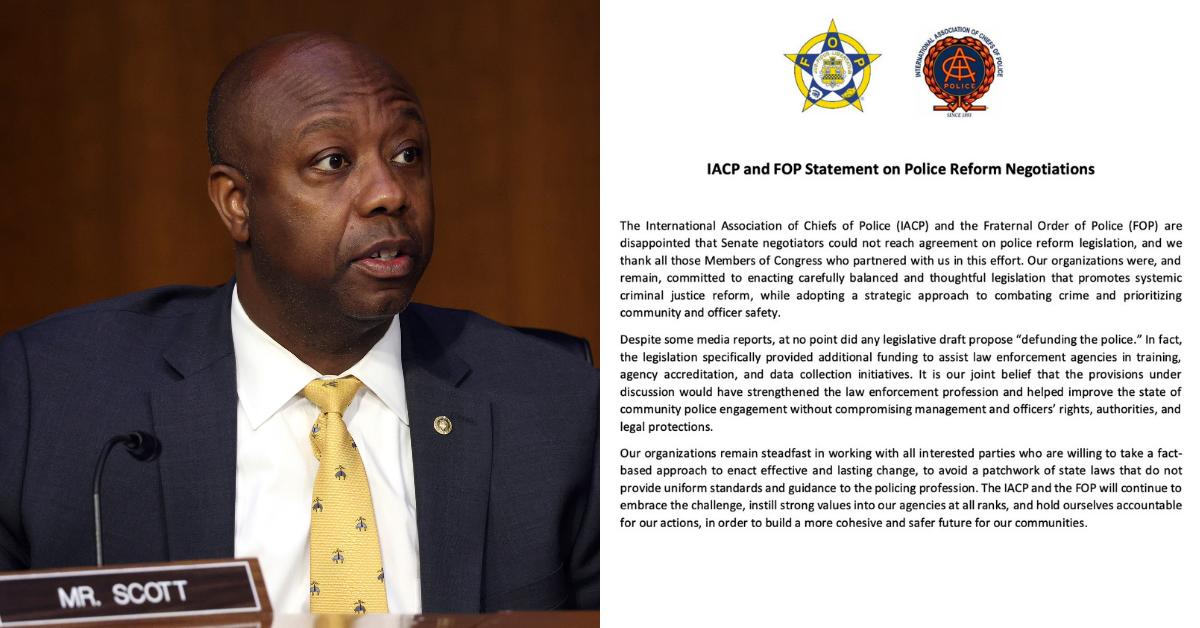police union
Top stories
National Police Org Contradicts GOP Senator's Claim That Dems Wanted to 'Defund the Police' in Failed Bill
After the collapse of bipartisan legislative negotiations regarding police reforms, the GOP seems to be trying to pass the fault off on to other parties. Tim Scott, Republican Senator from South Carolina, sought to blame Democrats' desire to defund the police for talks falling through.
President Biden, on the other hand, cited Republicans having:
"rejected enacting modest reforms, which even the previous president had supported."
Senator Scott told CBS Face the Nation's Margaret Brennan a very different story during an interview on Friday:
"We said simply this: 'I'm not going to participate in reducing funding for the police after we saw a major city after major city defund the police.' Any provisions in this bill that he wanted me to agree to limited or reduced funding for the police"
Scott had been working with Senator Cory Booker and Representative Karen Bass for more than a year to negotiate police reform policy. The push for police reform legislation was amplified by the murder of George Floyd by then Minneapolis Police officer Derek Chauvin on May 25, 2020, as well as other incidents of police brutality over the past several years.
According to a document obtained by CBS News, the bill that was being negotiated would ban practices like no-knock warrants and the use of choke-holds, would limit the militarization of police forces by limiting their access to military-grade equipment, and would beef up federal data collection.
It also described some reforms that local police departments would have to make in order to continue to receive COPS and Byrne grants.
When Brennan pointed out that Democrats argued that the bill would actually lead to an increase in funding for departments making the required reforms, by increasing funding for things like mental health resources and body cameras, Scott attempted to make the case that those reform requirements would make departments who choose not to make the necessary changes ineligible for grants, therefore cutting funding to local police departments—which is kind of the whole point of police reforms in the first place.
"Here's what we know: We have about $1 billion in grant money that goes to police. When you start saying, 'In order to receive those dollars, you must do A, B and C. And if you don't do a B and C, you literally lose eligibility for the two major pots of money — the Byrne grants and the COP grants' — when you tell local law enforcement agencies that you are ineligible for money, that's defunding the police, there's no way to spin that."
Despite Scott's claims that negotiations disintegrated because of Democrats pushing for defunding the police, it would seem that decreased funding wasn't on the table anyway.
The National Fraternal Order of Police (FOP) and the International Association of Chiefs of Police (IACP) released a joint statement via Twitter saying that they were disappointed that negotiations had dissolved, and that decreasing funding to police departments was never part of the negotiations in the first place.
"Despite some media reports, at no point did any legislative draft propose 'defunding the police.' In fact, the legislation specifically provided additional funding to assist law enforcement agencies in training, agency accreditation, and data collection initiatives."
"It is our joint belief that the provisions under discussion would have strengthened the law enforcement profession and helped improve the state of community police engagement without compromising management and officers' rights, authorities, and legal protections."
🚨 BREAKING: @TheIACP and the National Fraternal Order of Police issue statement on Police Reform Negotiations READ… https://t.co/swQicVz2xn— National Fraternal Order of Police (FOP) (@National Fraternal Order of Police (FOP)) 1632842195.0
Twitter users were largely critical of police in general, but more critical of GOP lawmakers like Scott who failed to negotiate police reforms.
@GLFOP @TheIACP This puts a giant hole in republican’s delusional narrative that Dems wanted to defund the police— yourdailydoseoftruth (@yourdailydoseoftruth) 1632846064.0
@GLFOP @mommamia1217 @TheIACP So much for @GOP backing the blue. They voted against funding the police.— Asher and Axtons PawPaw (@Asher and Axtons PawPaw) 1632862706.0
@GLFOP @TheIACP https://t.co/ANldfZPTzI— J Leep (@J Leep) 1632857691.0
@Sifill_LDF Can't bring himself to "defund the police" if the won't ban dangerous practices like Choke Holds, but h… https://t.co/rkkLGP9y0c— JEFF (@JEFF) 1632790658.0
Some accused Scott of negotiating in bad faith from the beginning.
@Sifill_LDF He negotiated in bad faith the entire time. Dems should not have taken him seriously.— Get Vaccinated (@Get Vaccinated) 1632789297.0
@Sifill_LDF Repubs know what they’re doing. This whole thing was a waste of time to Biden NOT give a win to Dems &… https://t.co/o6oMttwVAH— DeVonne Richburg (@DeVonne Richburg) 1632792974.0
Others were critical of the FOP's stance.
@GLFOP @TheIACP Why is the cop union only taking issue the media repeating a corrupt GOP senator's lies, and not hi… https://t.co/cr1L3D24m6— 👽🛸 Crow - Feeder 🍀☠️ (@👽🛸 Crow - Feeder 🍀☠️) 1632860065.0
When Brennan brought up the fact that the proposed legislation would have codified the reforms required by former President Donald Trump's 2020 executive order, which also tied eligibility for funding to the adoption of reforms, Scott replied:
"The Trump executive order I actually agree to. What I did not agree to was the cuts that come from noncompliance."
It's hard to tell whether Scott was missing the point that funding was already tied to compliance, or intentionally ignoring it.
"I'm only saying that if you read the legislation, it's pretty simple. This is not something that I'm making up, and we can debate our facts. We can actually say, in several different areas of the bill, it reduces funding."
 SECONDNEXUS
SECONDNEXUS percolately
percolately georgetakei
georgetakei comicsands
comicsands George's Reads
George's Reads





